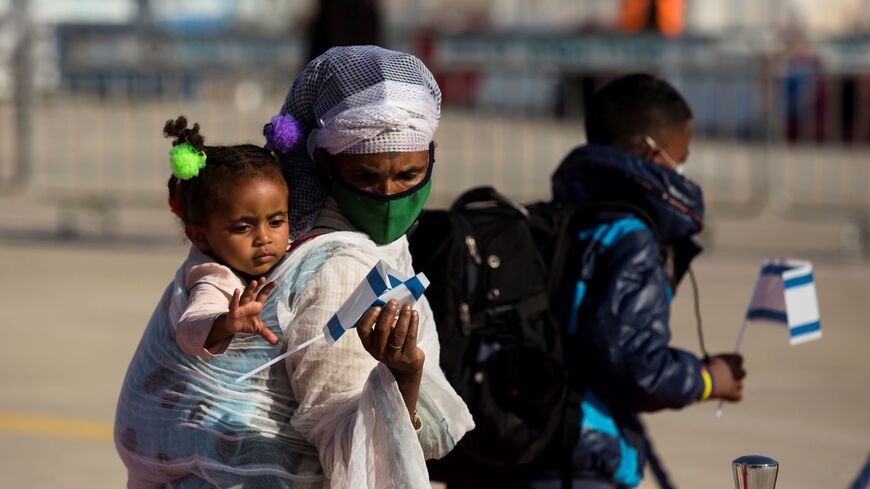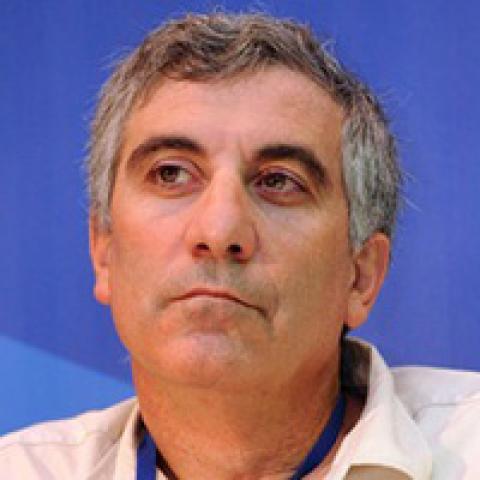After a week of debates and embarrassing reports, Interior Minister Ayelet Shaked and Immigration and Absorption Minister Pnina Tamano-Shata agreed on Nov. 9 to move forward with the immigration of 5,000 Ethiopians who claim an affinity to Judaism. The decision to hasten their immigration from their transit camps in Addis Ababa stemmed from the worsening security situation in Ethiopia's civil war.
The Israel National Security Council has opposed the decision, arguing that the security situation in Ethiopia doesn’t necessitate an emergency operation at this point. However, during the debate, security officials were instructed to prepare a plan in case of a further worsening of the situation.
At the meeting, participants heard that the Tigray rebels succeeded in winning several battles with the Ethiopian Army and even declared that they are preparing to storm the capital Addis Ababa. The United States and other Western nations started to evacuate their citizens from Ethiopia, and the Israeli Foreign Ministry started to evacuate families of diplomats and issued a travel warning.
The announcement after the meeting said that Shaked and Tamano-Shata expressed deep concern at the security situation in Ethiopia and thus worked to hasten the arrival of those waiting at transit camps.
The current situation has only deepened the controversy over bringing Ethiopians who claim affinity to Judaism to Israel — a controversy that has now lasted several decades. All Ethiopian Jews, about 40,000, immigrated to Israel in several waves during the 1980s and '90s. But next came the demand to bring Christian Ethiopians who are the descendants of Jews who converted hundreds of years ago, who are called the Falash Mura. The Israeli government determined that those who can prove that they are descended from Jews and who convert according to Jewish law would be allowed to immigrate. But although the government decision set quotas, transit camps keep refilling with relatives of those who have already immigrated.
The latest ruling, made in 2015, agreed to bring over the last 9,000 of those who claim to be Falash Mura, some of whom have relatives in Israel. In recent years, 4,000 have arrived in Israel, but for budgetary and political reasons, the arrival of the rest had been delayed.
Tamano-Shata, herself of Ethiopian origin, has dedicated her public life to the rights of Ethiopian Jews and even received the Martin Luther King Jr. Prize in 2006 from his son, Martin Luther King III, for her activism. At her initiative, the coalition agreement includes a clause to advance the immigration of those waiting in camps in Addis Ababa, and in recent days it was revealed that she was involved in the covert immigration of more than 60 Ethiopians to Israel, although most proved to be Christians with no connection to Judaism.
The secret operation was initiated during the previous government, and conducted by the Mossad. Tamano-Shata argued that the Ethiopians' lives were in danger, but an investigation by the Population Authority showed that “there are serious doubts regarding the petitioners’ relationship to Jewish ethnicity despite their affidavits,” and that “most of the petitioners did not come from a combat area as claimed and were not in life-threatening danger.”
A document issued by the National Security Council said that the number of people at the camps keeps growing, and that most of them don’t meet the criteria to come to Israel. The document further claimed that these people face no danger because of the war and that “bringing thousands of people awaiting clarification to Israel would be an unprecedented demographic mistake, and is unneeded and dangerous.”
Tamano-Shata criticized the document, claiming that it represents a political position meant to thwart the rescue of the remainder of Ethiopian Jewry. “The document should be thrown in the dustbin of history of the State of Israel," she said. "It shows ignorance of the Falash Mura and their roots, ignores that fact that people have been waiting for decades to come to Israel and that their first-degree relatives live here in Israel, and have returned to Judaism a long time ago and were brutally separated from their families during immigration.”
However, even among Ethiopian Jews who have immigrated to Israel there are differences of opinion. Some of their spiritual leadership agree with the National Security Council, and believe those waiting in the transit camps want to come to Israel for economic reasons. Several rabbis and spiritual leaders wrote to then-Prime Minister Benjamin Netanyahu in July 2020 that thousands have been brought to Israel who have no affinity to Judaism, and that they fear that it will happen again.
Tamano-Shata rejects this criticism and told Al-Monitor that she established an appeals committee to check doubtful cases, which will include two kessim, or Ethiopian Jewish spiritual leaders. According to reports she has received, she said, there are about five hundred children at the camps, who live in conditions of malnutrition. She says that the kessim agree to the immigration plan she has suggested.
Following the decision of Shaked and Tamano-Shata, the Ministry of Immigration and Integration is now pooling budgets to quickly bring over those remaining in the camps. But according to the decision, only 5,000 will be allowed in, while many more remain in the camps.








